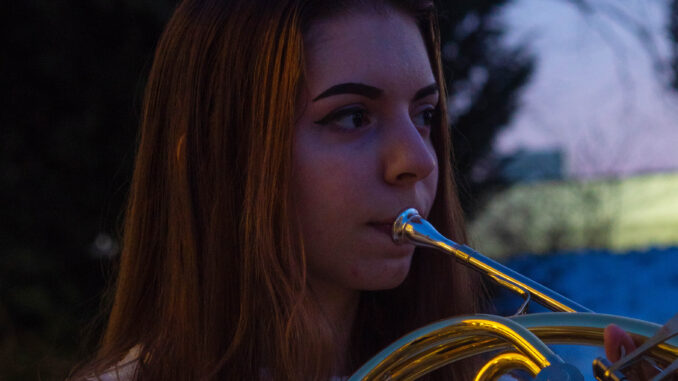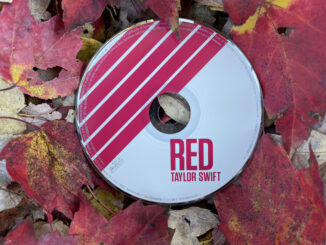
by Isabella Abbott | staff writer
Feb. 3, 2022
Last Saturday afternoon, Duquesne Composition for Media major and horn player, Elizabeth Pompa, had her new composition, “Clepsydra,” performed during the Pennsylvania Music Educators Association (PMEA) festival in the Powers Center Ballroom.
Pompa said she was honored when her professor and conductor, Dr. James Gourlay, gave her the opportunity to have a live concert band perform her piece twice this year: once by post-secondary students and then again by high school students. It was played during the Duquesne University symphony band back in November, and during the Jan. 29 PMEA concert last weekend.
Gourlay is a leading performer, teacher, music director and chief executive of Pittsburgh’s River City Brass.
Gourlay said he always likes to encourage students to express themselves musically, which is why he motivated Pompa to share her music with him.
“When I looked at Elizabeth’s music,” Gourlay said, “I immediately realized that she has enormous talent as a composer and a unique musical voice.”
The approximately seven-minute-long piece, consisting of 205 measures, was written in a week by Pompa back in August 2021. Even though editing for the composition was tedious, she said that the most challenging part is sitting down and “going with it.”
Pompa said she had many moments in her life where she wanted to give up and even took a break from music, not writing for a while and not wanting to go to college to pursue it, but she felt that it was something she had to do.
“I guess it’s just what I was born to do,” Pompa said.
Pompa started playing instruments at the young age of six and, during grades six through eight, taught herself a variety of different instruments: clarinet, trombone, French horn and flute. At 19, she now plays horn in the wind symphony orchestra, has written seven full compositions and has over 100 unfinished future projects.
“Sometimes,” Pompa said, “I come up with ideas that I could really use for one special piece.”
And one of those special pieces was “Clepsydra.”
Although this piece started with no title and had parts missing until September, Pompa was inspired by the sound of a metronome making the “tick-tock” sound that brought her to the idea of a clock. And, since she didn’t want her piece to simply be named “clock,” she came to find the unique title of “Clepsydra.”
“I wanted a fancier word than clock,” Pompa said.
Clepsydra, or water clock, is an ancient time-measuring device worked by the gradual flow of water into or out of a vessel, according to Pompa.
This clock was the most accurate use of timekeeping for millennia, which made for the perfect name of her piece since the dripping of the water conveyed the notes throughout the composition. Thus, writing the piece worked like clockwork for Pompa.
At last week’s PMEA program, local high school musicians had a day and a half to learn the music which Pompa said they did remarkably well. And, after the festival finished, students came up to Pompa praising her work, leaving the Duquesne artist gleaming and ecstatic for her next performances.
Gourlay said he’s excited to see what else Pompa has to offer in her career as well.
“I’m really looking forward to seeing her as she develops as a composer and look forward to programming more of her work,” he said.
Pompa’s newly written composition, “Wolf Hunt,” is five minutes long and will be conducted by Gourlay. On Tuesday, April 12, the composition will be performed in the Power Center Ballroom by the Duquesne University Symphony Band.




